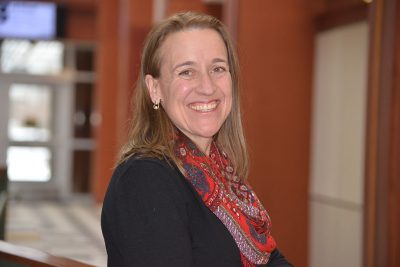Education Week (George Sugai is quoted regarding testimony at a U.S. House of Representatives committee meeting on the use of restraints and seclusion in schools)
Student Worker Spotlight: W Center Tutor Natasha Schweitzer
Daily Campus (Current Neag School student and member of the UConn Writing Center, Natasha Schweitzer, is profiled)
Charter Schools Exploit Lucrative Loophole That Would Be Easy to Close
Lessons From History Are Our Legacy for Future
Breaking Israel News (Neag School’s Alan Marcus is quoted about how to teach the Holocaust)
Michele Back on Teacher Leadership Through Advocacy

Editor’s Note: The following features an excerpt of a piece titled “Teacher Leadership Through Advocacy: The World Languages Advocacy Project,” authored by Michele Back, assistant professor of world languages education in the Neag School. Access the full article, originally published in the February/March 2019 issue of The Language Educator. This excerpt has been republished here with the permission of The Language Educator.
The ability to collaborate and advocate beyond the classroom and across stakeholders, from department chairs to administrators to parents, is a crucial teacher leadership skill. Moreover, the critical shortage of world language teachers, combined with the diminishing number of U.S. students taking world language courses, means that teacher candidates in this content area must be strong advocates for their own profession from the moment they step into the classroom.
“I have become increasingly preoccupied with the scarcity of world language teacher candidates, especially as compared to other content areas.”
—Michele Back, assistant professor, world languages education
During my time as the world language advisor and methods instructor at the University of Connecticut’s Neag School of Education, I have become increasingly preoccupied with the scarcity of world language teacher candidates, especially as compared to other content areas. I have wondered how our current candidates could apply their emerging leadership roles in ways that would encourage K–12 students to both continue learning languages and to also consider careers in world language education.
At the same time, I felt that our prior assessment for the American Council on the Teaching of Foreign Languages (ACTFL) /Council for Accreditation for Educator Preparation’s Standard 6 (a statement on advocacy for world languages) was failing to capitalize sufficiently on the leadership opportunities available to candidates in their final year of study. These considerations led to the creation of the World Language Advocacy Project.
The Neag School of Education certifies world language teacher candidates through two programs: Integrated Bachelor’s/Master’s (IB/M) and Teacher Certification Program for College Graduates (TCPCG). The goal of the master’s year, particularly for IB/M students, is to encourage teacher candidates to take on leadership roles in yearlong, school-based internships, preparing them to serve as innovators and agents of change.
Having already completed a semester of student teaching, students in their master’s year have an opportunity to go beyond the classroom and utilize their skills to enact change at a departmental, school, or even at the community level. Internship projects in world languages have included the incorporation of technology into a school’s world language courses, preparing students for annual proficiency testing, and creating and revising course curricula. These projects empower teacher leadership by allowing candidates to take the initiative to identify particular issues and challenges in the school setting, and then implement innovative projects that address them. In this way, candidates go beyond the classroom to collaborate creatively with a variety of stakeholders, from teachers and administrators, to parents and other members of the school community.
A required course on teacher leadership further scaffolds this experience. The issue of advocacy for world language teacher candidates is folded into the master’s year experience in the World Language Advocacy Project. This project involves the creation and implementation of two or more audiovisual artifacts that either promote language education or recruit future language teachers. I refer teacher candidates to ACTFL’s Educators Rising program for ideas and statistics about world language learning and teaching. I also encourage them to use whatever technology they feel most comfortable with to create these artifacts. Candidates have created Powtoons, videos, and Tumblr pages. Less tech-oriented projects are also acceptable, but I find that candidates become excited about the possibility of utilizing technology that both they and their students are familiar with in new and creative ways.
Continue reading Back’s Language Educator article in full here, in PDF format.
How Schools Spark Excitement for Learning with Role Playing and Games
KQED/NPR (Neag School’s Stephen Slota is quoted)
UConn’s Jamelle Elliott Happy to be Back Home
CT Post (Neag School alum Jamelle Elliott, who is a former UConn player and coach and UConn’s current associate athletic director for the National C Club, is profiled)
Charter Schools Exploit Lucrative Loophole That Would be Easy to Close
The Conversation (Neag School’s Preston Green co-authors commentary on charter school financing)
Now North Kansas City is Adapting Career and Technical Ed for Student with Special Needs
KCUR (Neag School’s Allison Lombardi is quoted)
Gifted and Talented Diversification Reaches for Full Potential
District Administration (Del Siegle quoted on gifted education programs)
